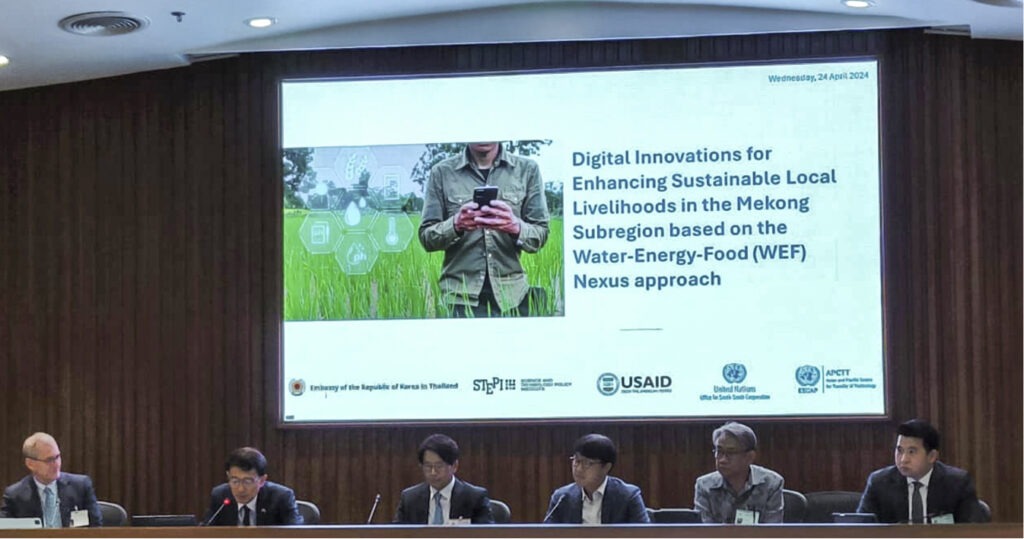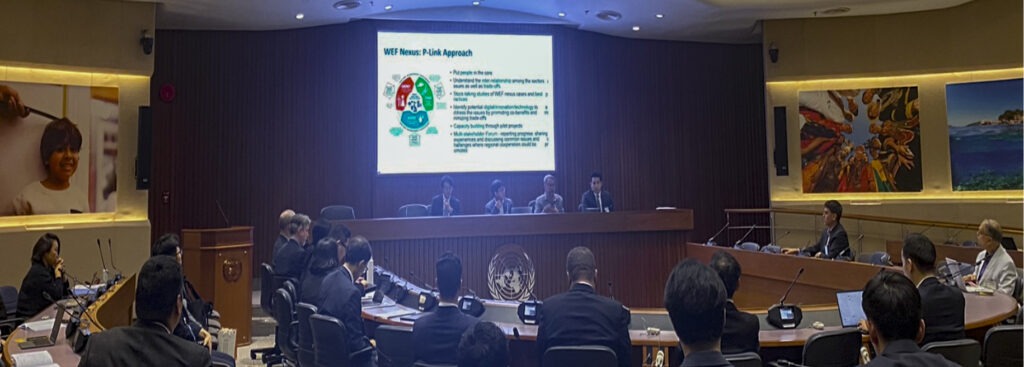Bangkok, Thailand, 24 April 2024: The Unite Nations Office for South-South Cooperation (UNOSSC) hosted a side event titled “Digital Innovations for Enhancing Sustainable Local Livelihoods in the Mekong Subregion based on the Water-Energy-Food (WEF) Nexus approach”, on the sidelines of the eightieth session of the Economic and Social Commission for Asia and the Pacific (ESCAP).
P-Link is a regional collaboration between UNOSSC, the Republic of Korea’s Ministry of Science and ICT (MSIT), and the Mekong River Commission (MRC), entitled, “Triangular Cooperation on Sustainable Development in the Lower Mekong Basin based on the Water-Energy-Food (WEF) Nexus”. Also known as the “RoK-UNOSSC Facility Phase 3” and P-LINK, the project aims to improve access to water, food and energy for vulnerable communities in the Lower Mekong Basin (Cambodia, Lao PDR, Thailand, and Viet Nam) by applying demand-driven innovative solutions and integrated approaches based on South-South and triangular cooperation modalities. In addition to knowledge generation, advisory services, and multi-sectoral platform among the four countries, the project is carrying out national technology pilots in each country.
The side event, co-organized with the Embassy of the Republic of Korea (ROK) in Thailand, the Science and Technology Policy Institute (STEPI), the United States Agency for International Development (USAID), and the Asian and Pacific Centre for Transfer of Technology (ESCAP/APCTT), brought together a diverse group of stakeholders to discuss and showcase innovative digital solutions within the WEF Nexus framework.
The event shared P-LINK’s multi-sectoral platform approach for integrated development, and showcased innovative solutions to tackle the water-energy-food (WEF) nexus challenges in Lao PDR and Thailand – both P-LINK project countries.
In addition, the event facilitated sharing among likeminded stakeholders working on WEF nexus initiatives such as on innovative ideas, experiences, and best practices highlighting the value of South-South and triangular cooperation.

Mr. Hahm Jeong-han, ROK Permanent Representative to ESCAP, delivering his remarks
Key presentations covered:
- Multilateral Stakeholder Engagement: Discussing the critical role of stakeholder engagement in translating digital solutions into practical applications for Mekong communities.
- Innovative ROK Solutions: Showcasing examples of digital innovations being introduced in Lao PDR and Thailand under P-LINK national pilots.
- Public-Private Partnership Best Practices: Presenting successful collaborations under the WE4F initiative.

Presentations about WEF initiatives in the Mekong region
A panel discussion, moderated by Dr. Hwanil Park, Chief Director at STEPI, explored the transformative impact of digital innovations on sustainable development, sharing success stories and strategies to overcome obstacles. Panelists provided recommendations for the successful implementation of P-LINK based on their experiences with similar projects.
Ms. Yejin Kim, UNOSSC P-LINK Project Manager, underscored that people must be at the centre of development, as highlighted in the name of project. ‘P-LINK’, she noted is an acronym for “People’s Livelihoods Initiative through water-energy-food Nexus in the Mekong Region”.
“Tailored innovation solutions and various development approaches are mechanisms to achieve inclusive, sustainable and resilient development for our beneficiaries, based on the principles of South-South and triangular cooperation”, Ms. Kim said. In this regard, P-LINK works to enhance livelihoods for people living in the Mekong Subregion. UNOSSC, together with P-LINK stakeholders, is calling for strong partnerships in establishing a model of integrated resource management that can be replicated across the region, contributing to the overall well-being and prosperity of the Mekong Basin.
The side event facilitated networking among stakeholders and increased awareness of digital innovations’ role in promoting sustainable and climate-resilient livelihoods. Participants exchanged valuable insights, underscoring the significance of strategic partnerships and collaboration in the WEF Nexus approach. In addition to increasing visibility of P-LINK, the event contributed to the broader efforts of the project to enhance sustainable, resilient, and inclusive livelihoods in the Mekong Subregion through fostering knowledge sharing and multi-sectoral cooperation.
